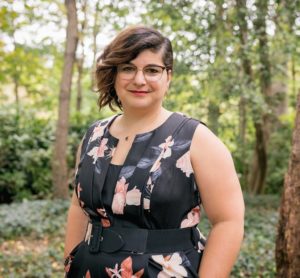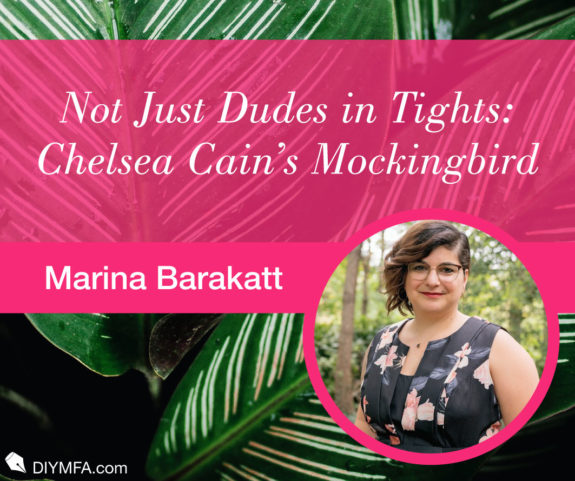The good news about Chelsea Cain’s Mockingbird, which had an eight-issue run from 2016-2017, drawn by Kate Niemczyk and colored by Rachelle Rosenberg (an all-woman team! You love to see it) is that off the bat it’s funny, action-packed, explicitly feminist, and it won’t take you long to get through the eight issues.
The bad news is that, by the end of the eight issues, you’ll be head over heels in love with Barbara “Bobbi” Morse, aka Mockingbird, you’ll be desperate for more, and it will be over.
This short run of Chelsea Cain’s Mockingbird is the embodiment of the phrase “this is why we can’t have nice things.”
A Brief Overview of Chelsea Cain’s Mockingbird
Mockingbird first appeared as a Marvel Comics character in 1971, had a run-in West Coast Avengers in the 80s and 90s, and popped back up as a regular cast member of various Marvel runs in the 2010s. She’s been an agent of S.H.I.E.L.D, including in the TV show played by Adrienne Palicki, married to Clint Barton aka Hawkeye, and has died and been resurrected, among many other things.
Chelsea Cain’s Mockingbird is something special. Bobbi, a longtime superhero, is a smart, sarcastic, take-no-crap woman who knows that plans tend to go better when she’s in charge and has no problem saying so.
There are two main plotlines in this run: in the first, Bobbi is looking for an anti-viral serum for a virus that has given her new superpowers and turned a bunch of dead bodies into zombies. As this must be done within S.H.I.E.L.D’s healthcare facilities, she makes do with what’s available: Miles Morales aka Spiderman, at the doctor for chickenpox, and a clinically depressed Howard the Duck. Together they save the day while highlighting the inadequacies of the American health care system (they are all on, after all, their employer’s health insurance).
The second main plotline is a murder mystery on a cruise ship, the noir language juxtaposed against the imagery of the superhero fan convention taking place on the ship. Here Bobbi teams up with her sometimes lover Lance Hunter, the ship’s staff, and a bunch of corgis (including, it must be said, mer-corgis). It’s whimsical and funny but ends with Bobbi facing off against her stalker, which is given enough emotional weight that the reader has no choice but to remember that the greatest danger to any woman, even superheroes, are the men who think they have a right to her body.
Chelsea Cain’s Mockingbird and Feminism
Bobbi talks frankly about what it’s like to be a woman in the workplace because even superheroes aren’t immune from workplace sexism, and shows us, through a teenage girl with dangerous superpowers, the difficulty of growing up in a society where womanhood is vilified and demonstrates the difficulty of being taken seriously as a woman in STEM (she has a Ph.D. in biology, after all).
Her relationships are on her terms, and the men she allowed to get close to her understand their place in her life and are more than happy to fall in line. The men who don’t end up, more often than not, on the floor after a kick to the head.
The artistic and editorial choices Cain and Niemczyk make are obviously intentional. Bobbi still has blonde hair, a small waist, and a thigh gap, but she feels like your most conventionally attractive friend, rather than the anatomical anomalies that exist as women’s bodies in other mainstream comics.
The men are the eye candy, and Clint and Lance are more than happy to wander around in their underwear (while Bobbi is fully clothed) for no reason other than to make a point about how women are usually portrayed in media historically made by and for men.
The comic is very straight and mostly white, but I have a feeling that if the team was allowed to continue, the diversity of the characters and storylines would have continued to expand.
The unfortunate decision to cancel the series was made halfway through its run due to low sales, despite excellent reviews, but the first volume of collected issues would later hit #1 on Amazon. There was a lot of misogynistic ugliness surrounding this series’ run, which ended in Chelsea Cain quitting Twitter over the hate she received after the last issue published: the cover showed Bobbi on the beach, lemonade in hand, wearing a shirt that reads “ASK ME ABOUT MY FEMINIST AGENDA.” I was initially going to go into it here, but I’d rather focus on the comic itself: smart, feminist, funny, and deeply necessary in a world where men will chase a woman off the internet for sticking up for herself. While gone too soon, I can only hope it inspires future writers to choose this path. And order Man-Eaters, Chelsea Cain’s follow-up comic project.

Marina is a West Coast native living in Washington, DC. She loves writing anything, from sci-fi to creative non-fiction to romance, often drawing inspiration from the frequent travel required by her day job. Her work has appeared in such literary magazines as DistrictLit and Corner Bar Magazine. When she’s not writing, you can find her hosting bar trivia, baking something involving peaches, or bothering her extremely patient dog, Daisy. You can read more of her work at marinabarakatt.com and find pictures of Daisy at @marinabarakatt.







